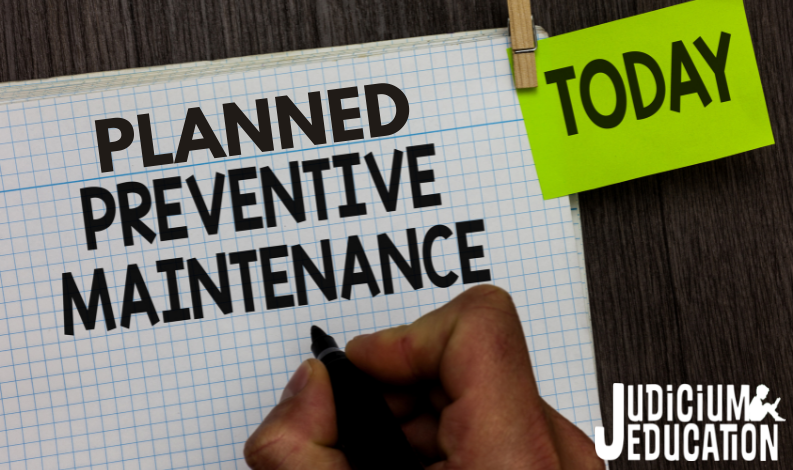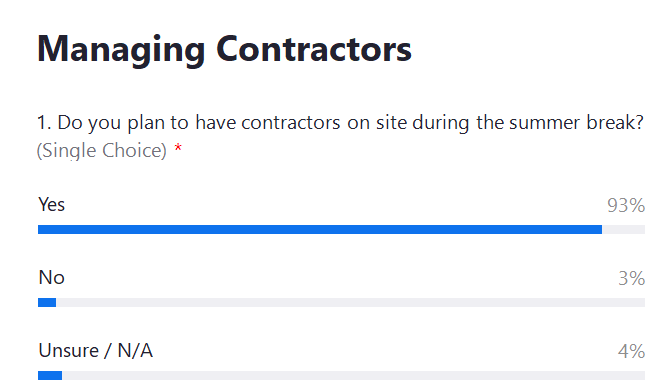Health & Safety: It's not Just Safe Buildings - How to Use Planned Preventative Maintenance Effectively

This session focused on understanding what planned preventative maintenance programs are; reviewing delegated responsibilities for school staff; managing contractors - competency and safe working; and remedial works - priorities, budgets and record-keeping.
What Are Planned Preventative Maintenance Programs?
Understanding what planned preventative maintenance programs are can help you see the broader picture in terms of managing all the different components across your buildings.
Whilst every day will include some form of ad hoc facilities related requests or repairs, these are reactive. For health and safety, it is always better to be in a position where the majority of compliance-related work is proactive to prevent incidents - like the saying, an ounce of prevention is worth a pound of cure!
Preventative maintenance programs allow you to categorise the key areas of maintenance across all the services and equipment in your building to then apply the statutory time frames and competent people required.
Key areas (but not an exhaustive list) are:- Legionella survey and management
- Window surveys
- Tree surveys and management
- Work equipment including gas systems
- automatic gates
- extraction systems
- fire alarm
- emergency lighting
- LOLER – Lift Testing
- pressure systems
- lightning conductors
- Electrical systems – fixed wired and PAT testing appliances
Poll

Reviewing Delegated Responsibilities for School Staff
Within the remit of health and safety, there are several areas that do not come directly within premises management.
Often, we find that subjects outside of the premises team remit are not subject to safety audits.
The Headteacher/Principal will delegate responsibilities to relevant staff across the school, but it is not formalised.
- Policy, communication, monitoring and business continuity plan
- SLT responsibility
- First aid and Medicines
- Trained medical lead and lead first aider
- Practical department management
- Head of Departments and technicians
- Educational visits, including Sports Fixtures
- Stress management and staff welfare
- SLT (and Well-being Lead if in place)
Managing Contractors - Competency and Safe Working
Important questions to ask:- Do you have a managing contractors’ policy? If so, what does it include?
- How do we ensure contractors are competent and can work safely?
- How do we vet contractors?
- How do we respond to emergency works?
- How do we manage contractors on site?
- Have you seen their risk assessment?
We need to ensure it is clear what the process is for selecting contractors for work, how we ensure they are competent and will work safely.
Your policy should detail:- Who within the school is responsible for vetting contractors?
- How written evidence will be obtained before they start work?
Vetting and selecting contractors:
- prequalification questionnaires to clarify competency/qualifications
- insurance
- risk assessments
- method statements
Planning work and site inductions (including access outside of term time):
- security arrangements
- fire evacuation
- accident and incident response
- who from the school is supervising contractors
Remedial Works - Priorities, Budgets, and Record-keeping
Reports such as legionella surveys, asbestos surveys, emergency lighting or fixed wiring condition reports often contain a lot of detail. Prioritising the important information can be difficult.
Some key questions to ask are:
-
Who checks the reports and understands them to log what work is required?
-
How would you approach prioritising large or expensive projects such as fire door replacement?
-
How do you track remedial works to ensure they are completed correctly by a competent contractor, and you have written records of what has been completed?
Judicium offers a great deal of support to our clients when service reports are reviewed during the audit process to provide a fresh pair of eyes on what can be 80+ page reports discussing what is required.
Our clients utilise the Judicium Facilities system on Jedu to log, monitor and sign off remedial works.
3 Key Points to Take Away
-
Review roles and responsibilities within your policies and organisational charts for local provisions at school level and central management provisions to ensure your policies remain fit for purpose into September 2022.
-
Review who is on site over summer from your own staff and in the form of external contractors, e.g. Trade contractors for servicing/remedial works OR activity providers such as Bob’s Football academy OR hiring out your facilities to third parties.
-
Review service reports to identify and prioritise remedial works to allow sufficient pre-planning for budgets and onsite arrangements.
Additional Info:
The Health and Safety Service is also providing CPD accredited training courses. For more information please click here.
HSE Guidance on Stress Management: https://www.hse.gov.uk/stress/standards/
HSE Windows Guidance (Regulation 14, pg 29) – https://www.hse.gov.uk/pubns/priced/l24.pdf
To review Judicium’s forthcoming sofa sessions please click here.
Follow us on Twitter - @JudiciumEDU
© This content is the exclusive property of Judicium Education. The works are intended to provide an overview of the sofa session you attend and/or to be a learning aid to assist you and your school. However, any redistribution or reproduction of part or all of the contents in any form is prohibited. You may not, except with our express written permission, distribute or exploit the content. Failure to follow this guidance may result in Judicium either preventing you with access to our sessions and/or follow up content.
Related content
.png)
This blog is based on Judicium’s Health and Safety ‘Sofa Session’ from the 7th January 2026, with our resident expert Jamie Ashard CMIOSH. This session focused on Common key stressors in the education sector, Applying the 6 key HSE management standards for stress, Completing a stress risk assessment and implementing practical solutions.
.png)
This blog is based on Judicium’s Health & Safety and SEND session on 26th November with resident expert India Cottenden
.png)
This blog is based on Judicium’s Food Safety Sofa session on 12th November with resident experts Sue Roberts and Tracey Killick

This blog is based on Judicium’s Health and Safety ‘Sofa Session’ on the 15th of October, with our resident expert Mike Wright.

This prestigious award celebrates our commitment to delivering expert, education-specific Health & Safety support that lifts the burden for school teams while raising safety standards across the sector.

This blog is based on Judicium’s Health and Safety ‘Sofa Session’ from 18th June, led by resident expert , Mike Wright, CMIOSH. This session focuses on the control of substances hazardous to health (COSHH) and their relevance in school settings, how assessments should be undertaken and what staff could be at risk.

Sofa Sessions | H&S